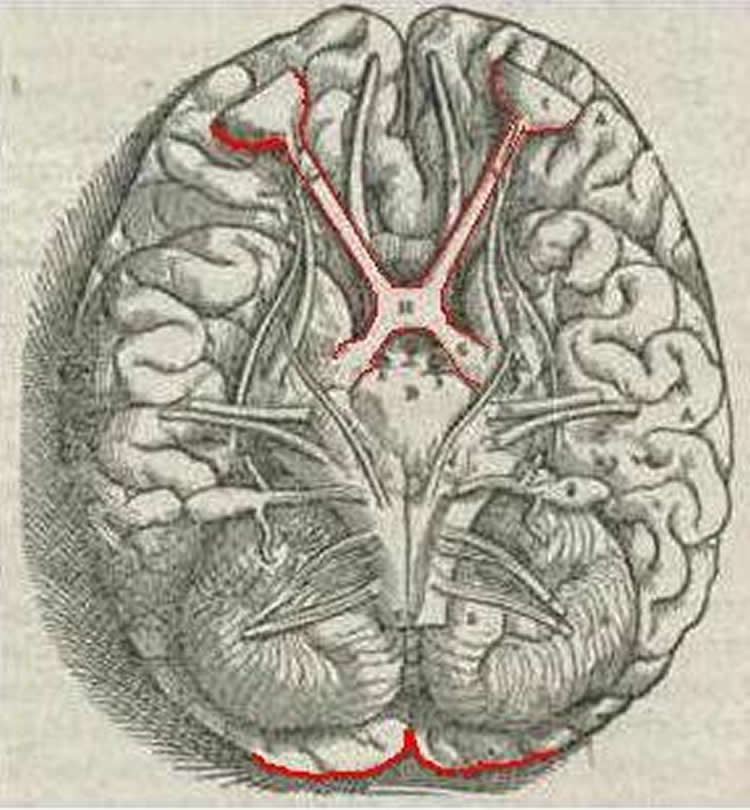Temporary visual deprivation shortly after birth induces permanent auditory responses in the visual area of the brain, highlighting a crossmodal competition for brain territories during the early sensitive period of brain development.
A brief period of postnatal visual deprivation, when early in life, drives a rewiring of the brain areas involved in visual processing, even if the visual restoration is completed well before the baby reaches one year of age, researchers at the University of Trento, McMaster University, and the University of Montreal revealed today in Current Biology.
Scientists have long known that the functional neural architecture for perception and cognition strongly depends upon plasticity: in other words, our brain has the capacity to change and adapt as a result of experience. As a number of neuroimaging studies show, the early onset of permanent blindness alters the response of the neurons of the visual cortex and causes a cortical compensatory re-organization in the occipital lobe. This lobe, where visual functions are typically located, becomes active during the processing of auditory stimuli. The recruitment of visual areas for auditory tasks is sometimes thought to underlie the better performance in processing inputs from other senses observed in congenitally blind people.
What was not clear yet was whether a short and transient period of postnatal visual deprivation is sufficient to trigger crossmodal reorganization that persists after years of visual experience. In order to answer that question, the researchers characterized the brain responses to auditory stimuli in 11 adults who had been treated for congenital cataracts in both eyes. These adults had been deprived of all patterned vision from birth until the cataracts were removed surgically and the eyes fitted with appropriate contact lenses that restored nearly normal visual input. The age at treatment varied from 9 days to just under 8 months of age. The control group consisted of 11 visually normal adults.
“The cataract-recovery participants had been blind for less than 8 months, but their blindness occurred at birth, during the most sensitive period for brain development. They showed enhanced auditory-driven activity in focal visual regions”, explained study leader Olivier Collignon, who undertook the work at University of Trento and the University of Montreal. “Thus, a short and transient period of visual deprivation early in life leads to enduring large-scale crossmodal reorganization of the brain circuitry typically dedicated to vision. This compellingly highlights the role early postnatal experience plays in shaping the functional architecture of the brain”.

Crossmodal plasticity in the case of blindness is a vital brain mechanism for compensating for visual deprivation, but the mechanism can have also negative effects on visual restoration, because it might interfere, to a certain extend, with the optimal resettlement of the regained sensory inputs. “Crossmodal plasticity may therefore be considered as a two-edged sword”, Collignon added. The existence of auditory responses in the occipital cortex of cataract-recovery patients, as observed in the study, therefore poses crucial questions regarding how these non-visual inputs coexist or even interfere with visual functions. Olivier Collignon and his collaborators are now investigating further how this crossmodal reorganization might contribute to the impaired visual abilities observed in cataract-reversal patients. Resolving this crucial question may impact on how visual training programs are developed for visual restoration.
Funding: This research was supported by the Quebec Bio-Imaging Network, Canadian Institutes of Health Research, Sainte-Justine Hospital Foundation, Belgian National Funds for Scientific Research, European Research Council.
Source: William Raillant-Clark – University of Montreal
Image Source: The image is in the public domain
Original Research: Abstract for “Long-Lasting Crossmodal Cortical Reorganization Triggered by Brief Postnatal Visual Deprivation” by JOlivier Collignon, Giulia Dormal, Adelaide de Heering, Franco Lepore, Terri L. Lewis, and Daphne Maurer in Current Biology. Published online August 20 2015 doi:10.1016/j.cub.2015.07.036
Abstract
Long-Lasting Crossmodal Cortical Reorganization Triggered by Brief Postnatal Visual Deprivation
Highlights
•We tested people with congenital dense bilateral cataracts that were treated in infancy
•Short visual deprivation early in life triggers life-long crossmodal plasticity
•Cortical connections appear to mediate auditory activity in occipital regions
•Early sensory experience permanently shapes brain architecture
Summary
Animal and human studies have demonstrated that transient visual deprivation early in life, even for a very short period, permanently alters the response properties of neurons in the visual cortex and leads to corresponding behavioral visual deficits [ 1–7 ]. While it is acknowledged that early-onset and longstanding blindness leads the occipital cortex to respond to non-visual stimulation [ 8, 9 ], it remains unknown whether a short and transient period of postnatal visual deprivation is sufficient to trigger crossmodal reorganization that persists after years of visual experience. In the present study, we characterized brain responses to auditory stimuli in 11 adults who had been deprived of all patterned vision at birth by congenital cataracts in both eyes until they were treated at 9 to 238 days of age. When compared to controls with typical visual experience, the cataract-reversal group showed enhanced auditory-driven activity in focal visual regions. A combination of dynamic causal modeling with Bayesian model selection [ 10 ] indicated that this auditory-driven activity in the occipital cortex was better explained by direct cortico-cortical connections with the primary auditory cortex than by subcortical connections. Thus, a short and transient period of visual deprivation early in life leads to enduring large-scale crossmodal reorganization of the brain circuitry typically dedicated to vision.
“Long-Lasting Crossmodal Cortical Reorganization Triggered by Brief Postnatal Visual Deprivation” by JOlivier Collignon, Giulia Dormal, Adelaide de Heering, Franco Lepore, Terri L. Lewis, and Daphne Maurer in Current Biology. Published online August 20 2015 doi:10.1016/j.cub.2015.07.036







